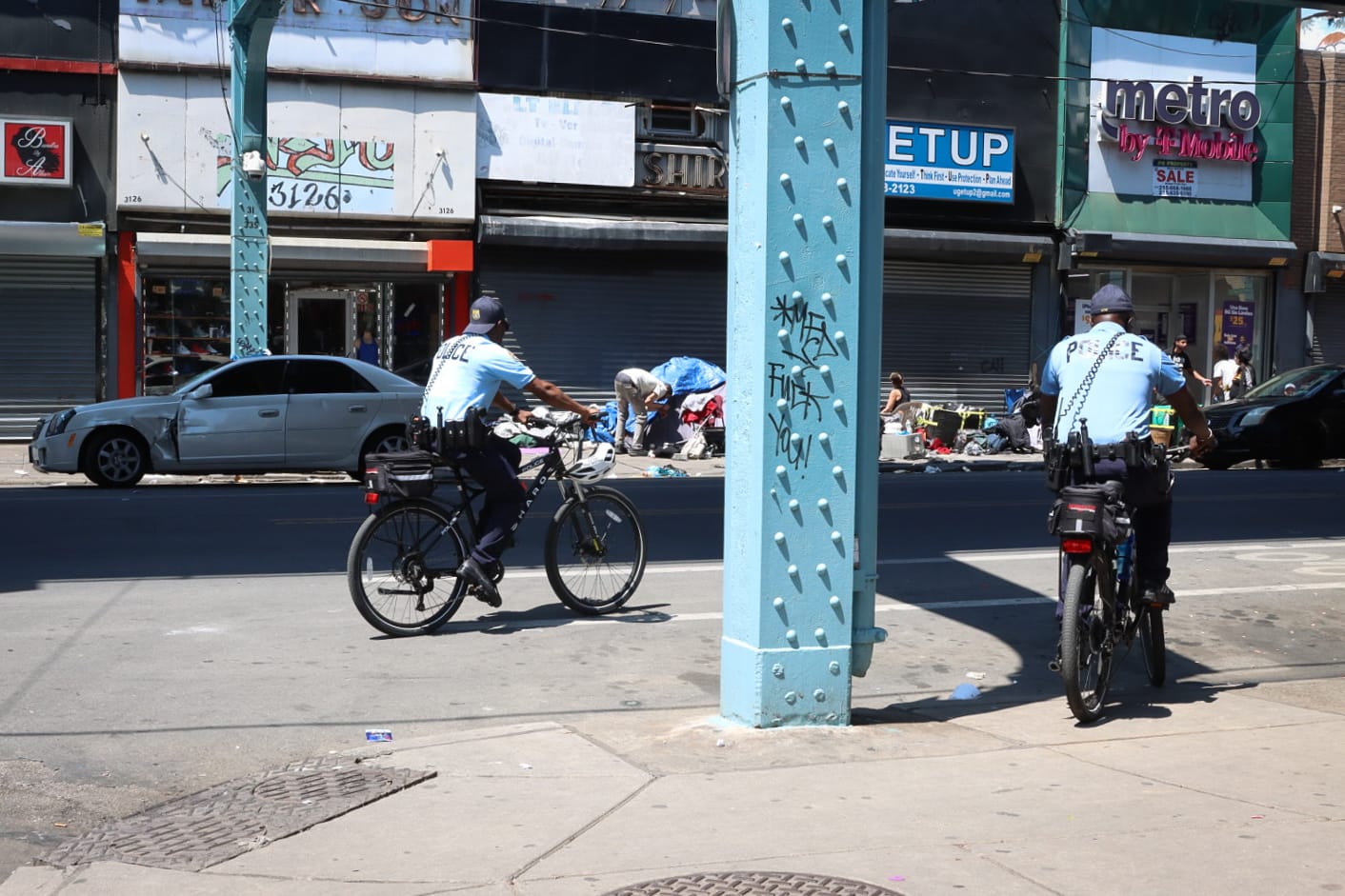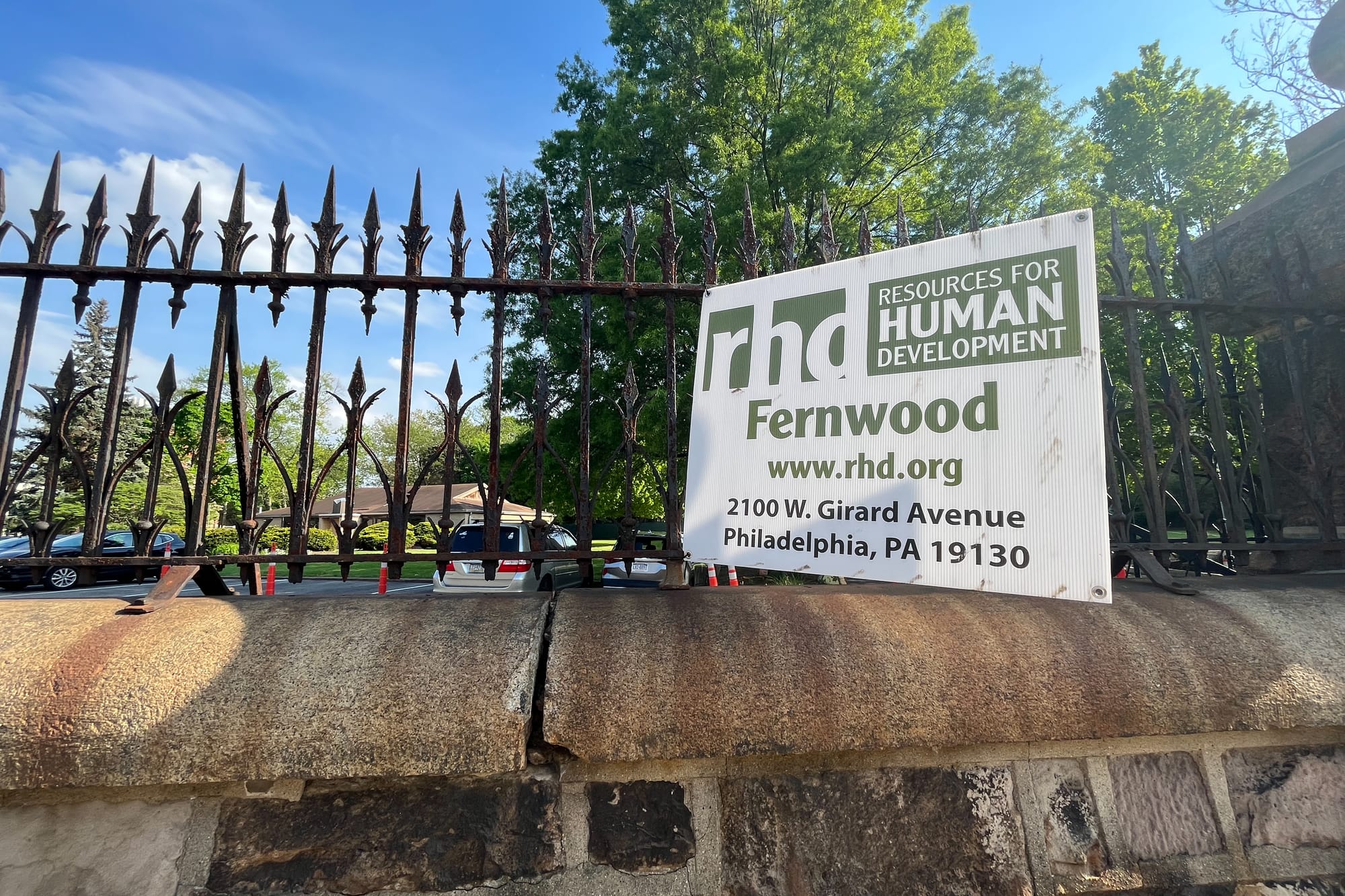Note: This is a developing story. Kensington Voice is investigating firsthand accounts of Philadelphia Police Department officers displacing unhoused residents before social service workers were onsite.
On Wednesday, social service providers and police officers will tell people living in tents or makeshift structures on Kensington Avenue’s 3000 and 3100 blocks to relocate. City leaders say the action will be led by social service workers offering individuals wound care, drug treatment, shelter and other help rather than by police looking to make arrests.
Kensington Avenue will be closed to car and foot traffic in both directions between East Orleans Street to Allegheny Avenue from 8 a.m. to 3 p.m. According to a city-issued advisory, vehicles will be detoured southeast to Frankford Avenue, Emerald Street, and nearby streets. ”
The city posted notices about this encampment clearing on April 4. Since then, outreach workers have been offering services to people in the area during the day, plus on Tuesdays through Thursdays from 4 p.m. to 8 p.m.
They’ve also been using the city’s Stranded Traveler Program to provide bus tickets to people who agree to be reunited with family outside Philadelphia, according to David Holloman, the executive director of the Office of Homeless Services.
Outreach workers have identified “upwards of nine” tents and 30 to 50 individuals that they intend to clear on Wednesday. City representatives said those workers have kept a list of individuals staying in those tents and plan to offer services to everyone on that list, as well as anyone else who may be obstructing sidewalks or creating a public health hazard.
“I’m happy to report we’ll have adequate levels of emergency department or treatment beds on that day,” Holloman said.
According to Noelle Foizen, director of the city’s Overdose Response Unit, the city will provide the transportation from Kensington to the services people are interested in accepting.
“If a person decides not to want to take us up on services, we’re going to continue to engage them,” said Holloman. “The tents are the structures that have been identified, we will be removing … You’re not allowed to block the pathway of the sidewalk from your tent or your structure.”
The Philadelphia Police Department said officers will be present to ensure safety for the people living in the encampment area and the outreach workers engaging them.
“Officers are going to be very hands-off,” said PPD spokesperson Eric Gripp. “It will be services-led. If a need arises for police intervention, we will have police in the area. But this is not an enforcement event.”
Since March 2018, the city has facilitated over 25 encampment resolutions citywide. Eight of those occurred in the Kensington area, most recently in August, according to the Managing Director’s Office. No arrests occurred during any of those 25 encampment clearings, Holloman said.
City officials said the following personnel and resources are expected on the ground:
- City social services partners
- Office of Homeless Services
- Homeless outreach teams
- Kensington wound care van
- Alternative Response Unit teams
- Medic unit
- Community Life Improvement Project
- Sanitation Department
- Philadelphia Police Department
- Police-Assisted Diversion

Concerns about increased enforcement
The encampment clearing comes after Mayor Cherelle Parker has repeatedly vowed to eliminate open-air drug markets in Kensington. Her five-phase plan for the neighborhood begins with a “warning and opportunity” phase followed by a “law enforcement” phase, both of which police representatives said will not begin until after the encampment resolution.
But more aggressive law enforcement approaches are ahead, according to police leaders.
“If we're going to hold people accountable, we're going to take people into custody,” said Deputy Police Commissioner Pedro Rosario at a Port Richmond community meeting last month. “And the charge would be for possession of paraphernalia, possession of drugs – that is illegal in the city of Philadelphia, believe it or not.”
During a Monday City Council meeting, Philadelphia Police Commissioner Kevin Bethel said the days of people “shooting up needles” and “selling drugs” without getting arrested are coming to an end.
“There's going to be a re-norming,” Bethel said.
That ramped-up enforcement will not begin on Wednesday, Foizen said.
“Folks think the encampment resolution is the start of phase two, and that there's going to be a lot of arrests and enforcement and all of that, and really, it's a service-led operation really focused on getting those connected to services and treatment,” she said.
Legal advocates and community organizers worry the encampment resolution presents an opportunity for police officers to ask people for identification, run their names through the system, and then book them on existing warrants.
“The majority of people who get picked up aren’t getting picked up for what they’re actually doing,” said Mike Lee, executive director of the ACLU of Pennsylvania, speaking generally about encampment clearings. “And depending on the result of that conversation with the individual, the interaction can be escalated to a full-blown detention.”
Up Against the Law and other local organizations have been holding “Know Your Rights” sessions in Kensington to inform people on what to expect and how to avoid arrest. Lee Kennedy, a Temple University law student who helped lead a talk in late April, said it’s important for people to know that they don’t have to engage with the police during the resolution action.
She and other advocates are also warning people to store items such as drugs, drug paraphernalia, weapons, or tools inside of a bag. Officers may presume a tool is a threat and use it as justification for a stop or pat-down, she said.
“We want people to be safe while using and we don't want them to be further harassed by police for using,” she said. “That might mean deciding where is best to use and where is best to carry your items … we're just trying to get the information out there so they can do what they can to best protect themselves.”

Creating capacity
A 2021 directive out of the Managing Director’s Office on the removal of tents and other structures states that police and outreach workers “shall offer alternative locations … or identify available housing” for encampment occupants starting on the date the encampment resolution notice is posted.
The encampment directive also states that when city employees move people from an area, they must also store their personal belongings for 30 days. Items that are considered hazardous, such as wet or infested bedding or clothing materials and perishable or combustible items, will be thrown out.
According to Holloman, outreach workers will be providing people with two bins each and keeping track of everything headed to storage. After people are connected to housing or other services, outreach staff will help to get them their belongings.
Holloman said there are ample beds across the city where outreach workers can place the 30 to 50 people they intend to relocate tomorrow, but declined to specify where the beds are located.
“There’s emergency shelter beds, there’s also safe havens, recovery houses, [and] inpatient treatment,” Foizen said.
Crisis response centers and hospitals will also be receiving people, said Amanda David, chief program officer at the city’s Department of Behavioral Health and Intellectual DisAbility Services.
A former Fairmount nursing home at 2100 Girard Avenue will be among the housing options that outreach workers will offer on Wednesday, according to a spokesperson for the Managing Director’s Office.
Just last week, the city announced plans to open 90 new beds at the facility, which has been used as a shelter since 2014 according to Managing Director Adam Thiel.
Thiel said the city “initiated a planning process to expand capacity” at the Girard Avenue site in March 2024 “to meet our immediate needs for additional beds and additional services, to take care of folks who need help today.”
The mayor’s office said that the Fairmount facility is “an expansion of existing services at an existing city-run facility,” and “is not a triage center” like the coalition of city council members who call themselves the Kensington caucus have proposed.
“There remains much more work to be done as the Parker administration works to build out a comprehensive system of long-term care, treatment and housing for individuals suffering from addiction to substances, mental health challenges, and people experiencing homelessness,” wrote Joe Grace, communications director for Parker, in an email to Kensington Voice.
Thiel said that there are “not enough beds” to address “what we believe is the unhoused population of the city” but that he and his staff are building “an entire ecosystem” for people experiencing substance use disorder.
There were 1,055 chronically homeless individuals in Philadelphia in January 2023, according to the city’s latest “point-in-time” count data. Of those, 71% were sheltered and 29% were unsheltered. The 2024 numbers haven’t been released yet.
“We are looking for and expanding beds with many existing providers,” Thiel said. “We are trying to fill in the middle and long-term space that doesn’t exist.”
Emily Rizzo contributed to this story.
Have any questions, comments, or concerns about this story? Send an email to editors@kensingtonvoice.com.





